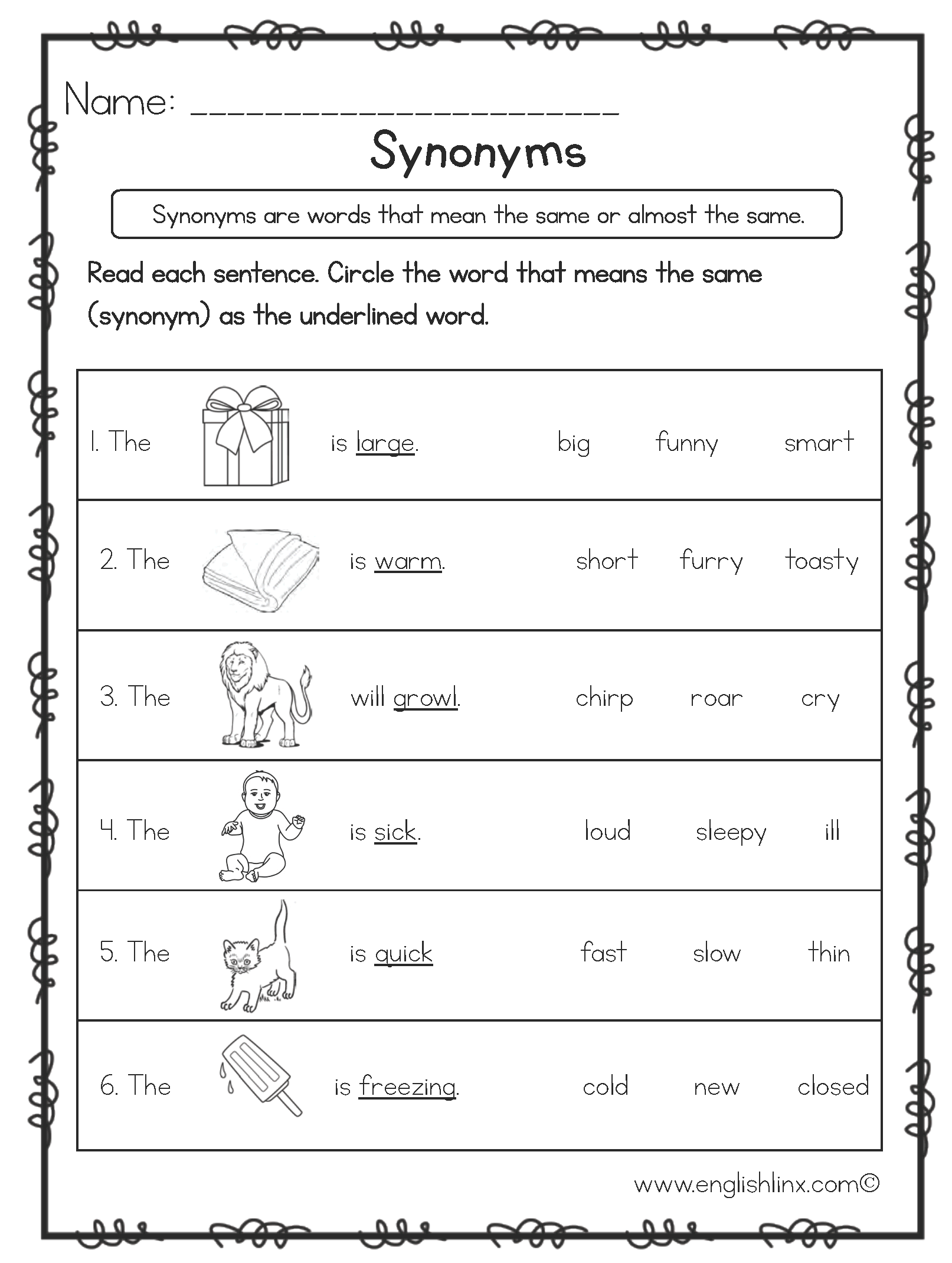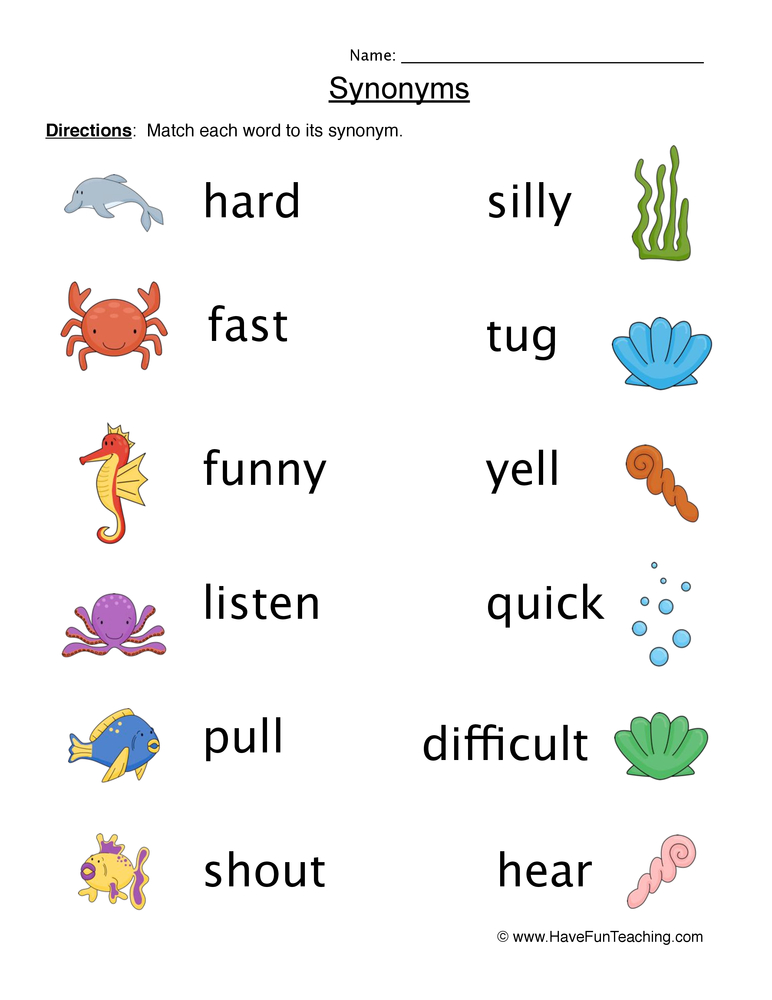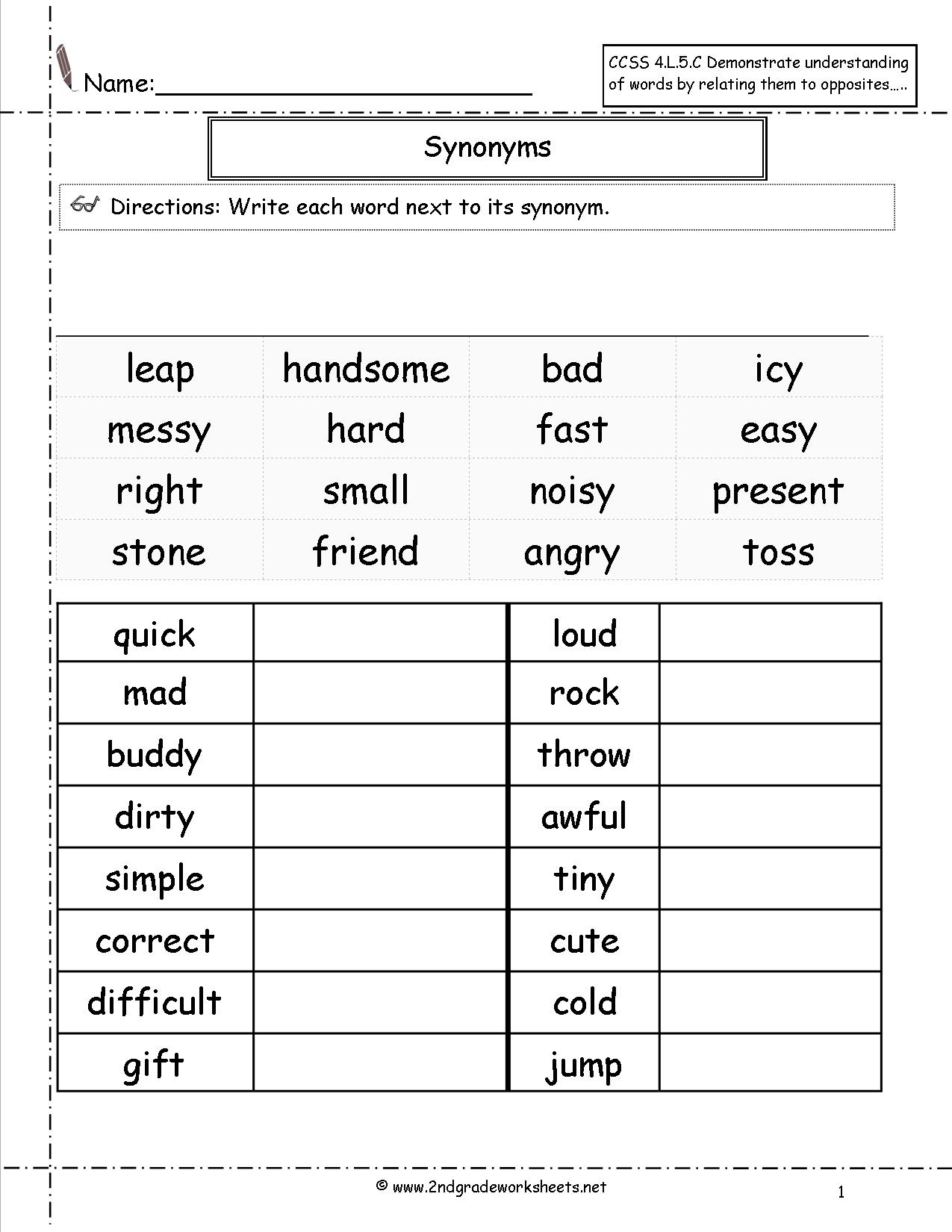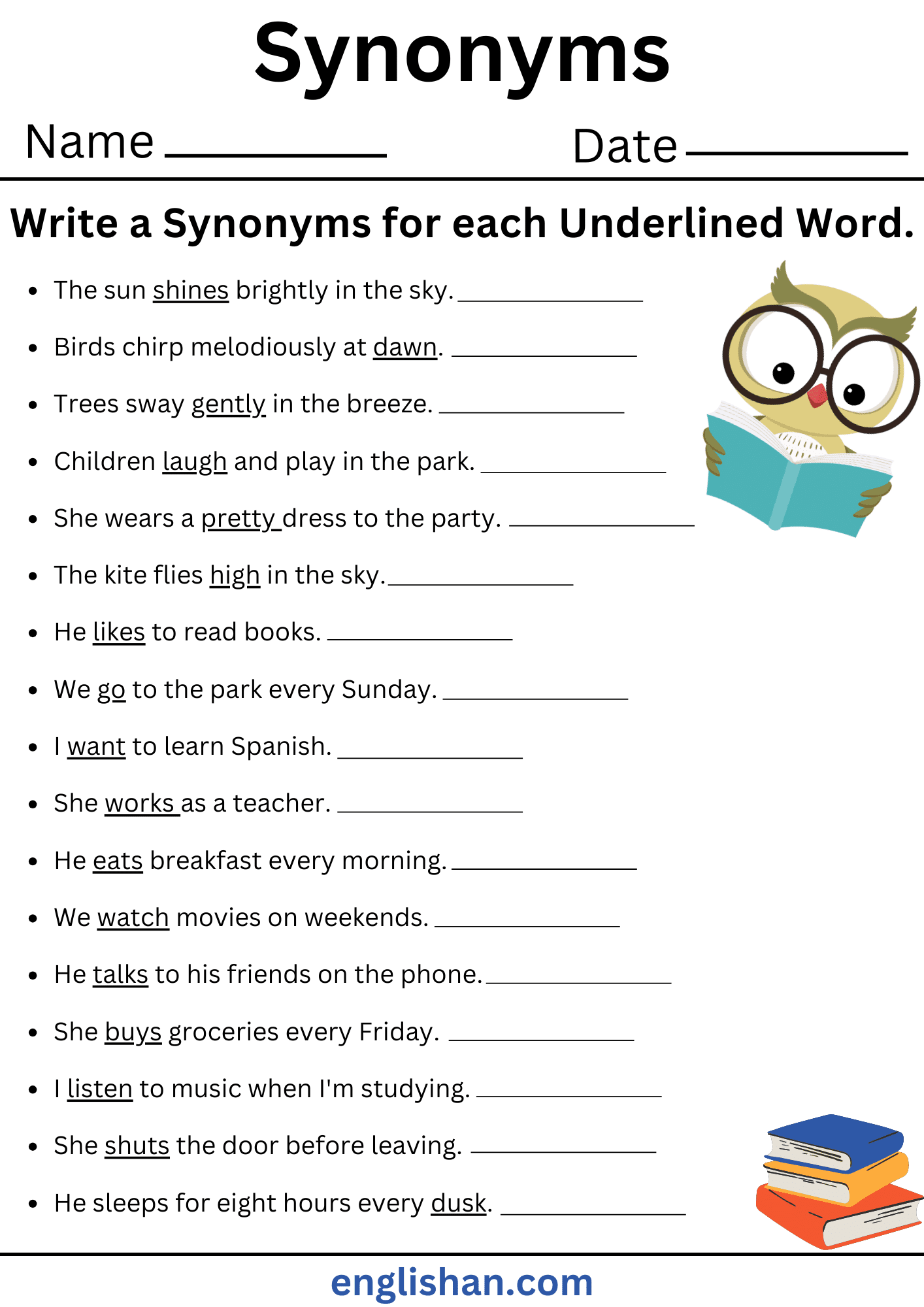
Unlocking Vocabulary Power: The Indispensable Role of Synonyms Worksheets in Language Learning
In the vast and intricate landscape of language, words are the fundamental building blocks of communication, thought, and expression. A rich vocabulary is not merely an indicator of intelligence but a powerful tool that enables individuals to articulate ideas with precision, understand complex texts, and engage in nuanced discussions. At the heart of vocabulary development lies the concept of synonyms – words that have similar or nearly identical meanings. Mastering synonyms allows language learners to move beyond repetitive phrasing, inject vibrancy into their writing, and grasp the subtle shades of meaning that define effective communication. This is where synonyms worksheets emerge as an invaluable educational resource, providing structured practice and reinforcing the nuanced relationships between words.
The Essence of Synonyms: More Than Just Words
Synonyms are often introduced as "words that mean the same thing," but this simplified definition barely scratches the surface. While "big" and "large" are synonyms, their usage can vary depending on context. "Big" might refer to a general size, while "large" could imply a more formal or significant scale. Understanding synonyms, therefore, involves not just knowing alternative words but appreciating their connotations, denotations, and appropriate contextual usage.

Why is this understanding so crucial?

- Enhanced Expression: It prevents repetition, allowing writers and speakers to vary their language, making their communication more engaging and sophisticated.
- Precision in Communication: Choosing the right synonym can convey the exact shade of meaning intended, avoiding ambiguity and ensuring clarity. For instance, "happy," "joyful," "elated," and "content" all convey positive emotions but differ in intensity and nuance.
- Improved Reading Comprehension: Recognizing synonyms helps readers understand unfamiliar words by relating them to words they already know, and it aids in grasping the author’s precise message.
- Critical Thinking: Selecting the most appropriate synonym from a list requires careful consideration of context, tone, and desired impact, fostering critical thinking skills.



What Exactly Are Synonyms Worksheets?
Synonyms worksheets are structured educational materials designed to help students identify, understand, and apply synonyms effectively. They come in a myriad of formats, from simple matching exercises to complex sentence rewriting tasks, catering to various age groups and proficiency levels. The core objective of these worksheets is to provide repeated exposure and practice, helping learners internalize the concept of synonymous relationships and build a robust vocabulary.

The Multifaceted Benefits of Incorporating Synonyms Worksheets
The consistent use of synonyms worksheets offers a wealth of benefits for language learners:

- Vocabulary Expansion: This is the most direct benefit. By encountering multiple words with similar meanings, students naturally broaden their lexicon. They learn not just one word, but a cluster of related words.
- Improved Writing Skills: Worksheets encourage students to move beyond basic vocabulary, prompting them to use more precise and varied language. This directly translates into more sophisticated, engaging, and articulate written pieces. Imagine the difference between an essay that repeatedly uses "good" versus one that employs "excellent," "commendable," "satisfactory," or "proficient" as appropriate.
- Enhanced Reading Comprehension: When students encounter an unfamiliar word in a text, their knowledge of synonyms can help them infer its meaning. Worksheets often present words in context, training students to use surrounding information to deduce word meanings.
- Development of Critical Thinking: Many synonym exercises require students to choose the best synonym for a given context, not just any synonym. This necessitates careful thought about connotation, nuance, and suitability, honing analytical skills.
- Grammar and Spelling Reinforcement: While primarily focused on meaning, many worksheets require students to write out words, reinforcing correct spelling. Some exercises might also touch upon parts of speech, ensuring students use synonyms that maintain grammatical consistency.
- Preparation for Standardized Tests: Vocabulary sections, particularly those focusing on word relationships, are common in standardized tests. Regular practice with synonyms worksheets can significantly improve performance in these areas.
- Increased Confidence: As students gain a stronger grasp of vocabulary and the ability to articulate their thoughts more effectively, their confidence in both spoken and written communication naturally increases.


Diverse Formats and Activities within Synonyms Worksheets
The effectiveness of synonyms worksheets lies in their variety. Different formats engage learners in distinct ways, reinforcing learning from multiple angles:
- Matching Exercises: The simplest form, where students draw lines connecting a word to its synonym from a separate list. This is ideal for beginners.
- Multiple Choice Questions: Students select the best synonym for a given word from a set of options. These can be made more challenging by including distractors that are close in meaning but not quite right.
- Fill-in-the-Blanks: Students are given sentences with a missing word and must choose the most appropriate synonym from a word bank to complete the sentence meaningfully. This emphasizes contextual usage.
- Sentence Rewriting: Students are asked to rewrite sentences, replacing specific words with synonyms without changing the original meaning. This directly applies vocabulary knowledge to sentence structure.
- Contextual Application: Similar to fill-in-the-blanks, but students might be given a word and asked to use its synonym in a new sentence, demonstrating understanding of both meaning and usage.
- Crossword Puzzles and Word Searches: These gamified formats make learning fun. Clues in crossword puzzles can be definitions or direct synonyms, while word searches help with word recognition and spelling.
- Shades of Meaning Activities: More advanced worksheets might present a group of synonyms (e.g., walk, stroll, trudge, march) and ask students to order them by intensity, formality, or to describe the specific scenario in which each would be most appropriate.
- Reverse Synonyms (Antonyms): Sometimes, a section on antonyms (words with opposite meanings) is included to provide contrast and further solidify understanding of word relationships.
Designing and Utilizing Effective Synonyms Worksheets
For educators and parents, creating and implementing synonyms worksheets effectively requires thoughtful consideration:
- Gradual Difficulty: Start with common words and clear-cut synonyms, gradually introducing more complex vocabulary and nuanced distinctions.
- Contextual Relevance: Whenever possible, present words within sentences or short paragraphs rather than in isolation. This helps students understand how words function in real-world communication.
- Clear Instructions: Ensure that the instructions for each exercise are unambiguous and easy to follow.
- Variety is Key: Rotate through different worksheet formats to keep students engaged and to target different learning styles.
- Engaging Content: If possible, tie the vocabulary to current topics, literature being studied, or themes that resonate with the students’ interests.
- Provide Answer Keys: For self-correction or quick grading, an answer key is essential.
- Encourage Discussion: After completing a worksheet, discuss the answers as a class. Ask students why they chose a particular synonym and explore the subtle differences between options. This fosters deeper understanding than mere memorization.
- Connect to Real-World Application: Encourage students to actively use new synonyms in their daily conversations, writing assignments, and creative projects. The ultimate goal is application, not just completion of a worksheet.
- Differentiate Instruction: Provide worksheets at varying levels of difficulty to cater to the diverse needs of learners in a classroom.
The Digital Evolution of Synonyms Worksheets
In the digital age, synonyms worksheets have evolved beyond mere paper-based exercises. Online platforms, educational apps, and interactive websites now offer dynamic and engaging ways to practice:
- Interactive Exercises: Drag-and-drop, click-to-match, and instant feedback mechanisms make learning more engaging and provide immediate reinforcement.
- Gamification: Many platforms incorporate points, badges, leaderboards, and other game-like elements to motivate students.
- Adaptive Learning: Some advanced platforms can adjust the difficulty of exercises based on a student’s performance, providing personalized learning paths.
- Accessibility: Digital worksheets can be accessed anywhere, anytime, on various devices, making learning flexible.
- AI-Generated Content: Artificial intelligence can now generate customized worksheets based on specific vocabulary lists or reading materials, saving educators valuable time.
Overcoming Challenges and Common Pitfalls
While highly beneficial, some challenges and pitfalls associated with synonyms worksheets need to be addressed:
- Over-reliance on Memorization: If students only memorize word pairs without understanding their nuances, the benefits are limited. Emphasize contextual understanding over rote memorization.
- Ignoring Context: A common mistake is to treat all synonyms as interchangeable. Educators must stress that while words may be similar, their appropriateness often depends on the surrounding words and the overall message.
- Lack of Follow-up: Worksheets are practice tools. Without subsequent application in writing, speaking, or reading, the learning may not stick. Integrate vocabulary into broader language arts activities.
- Boring or Repetitive Design: Monotonous worksheets can lead to disengagement. Varying formats and introducing new words regularly is crucial.
Conclusion
In the journey of language acquisition, vocabulary development stands as a critical pillar. Synonyms, with their ability to add depth, precision, and variety to communication, are an essential component of a robust vocabulary. Synonyms worksheets, in their myriad forms, serve as a foundational tool in this developmental process. They provide structured practice, reinforce learning, and build the confidence necessary for students to wield language with mastery. From traditional paper-based exercises to sophisticated digital platforms, these worksheets continue to play an indispensable role in helping learners unlock the full power of words, transforming them from passive receivers of information into articulate and nuanced communicators. Investing time and effort in the effective use of synonyms worksheets is, without doubt, an investment in linguistic proficiency and intellectual growth.
